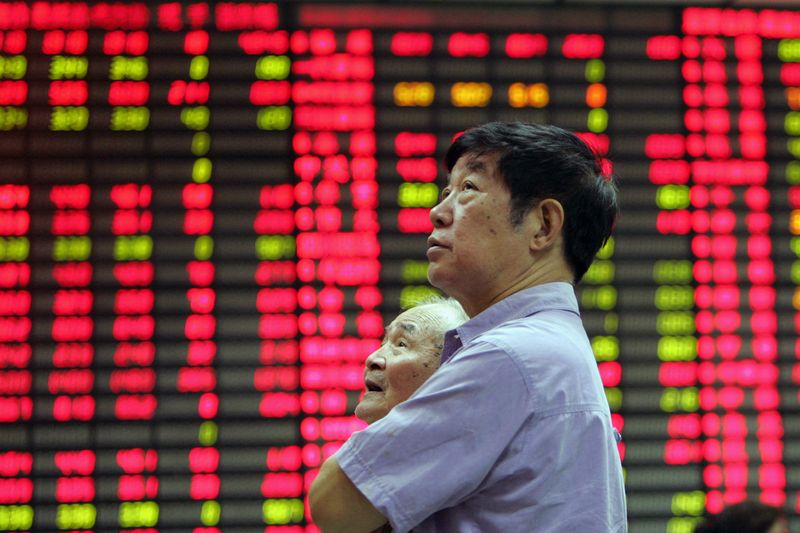(Reuters) - The Chinese Year of the Dragon is around the corner, but the world's second largest economy is anything but roaring right now, while tough talk from central bankers has made investors less confident about imminent relief from lower interest rates.
Optimism is still running high in markets, but a degree of caution means bonds may be gearing up for a strong month, even in a bumper earnings season for stocks.
Here's a look at the week ahead in world markets from Rae Wee in Singapore, Lewis Krauskopf in New York and Dhara Ranasinghe, Karin Strohecker and Amanda Cooper in London.
1/TOPSY TURVY
If stocks outshone bonds in January, the reverse may be true for February.
Dashed hopes of an early U.S. rate cut and a fresh slide in U.S. regional bank stocks -- reviving memories of the March banking crisis -- has suddenly cast a pall over stocks. Yes, world equity markets ended last month higher, but note the S&P 500 on Wednesday - and post-Fed meeting - closed with its steepest daily loss since Sept. 21.
Government bond markets, where yields ended January mostly higher, have been boosted by the safety bid and growing signs that big economies - think U.S. ADP employment index, euro zone and China factory activity - are weakening.
This should set the tone for the week ahead, with central-bank talk in focus. And the decoupling of bonds and stocks that began at the start of 2024 should continue.
2/THE DISINFLATION DRAGON
Chinese inflation data on Thursday will be the next test of the health of its economy, which is plagued by persistently weak demand, a beleaguered property sector and fragile investor sentiment.
January's producer and consumer price inflation figures are likely to underscore the country's struggling recovery, though the bigger question will be whether deflationary pressures have intensified.
Chinese markets have already had a brutal start to the year. The blue-chip index ended January down 6%, marking a record six-month losing streak.
Beijing's recent support measures seemed to have reassured investors for now and the expectation for further stimulus has driven the benchmark 10-year Chinese government bond yield to a two-decade low. As the Year of the Dragon looms, some are hoping the buzz of the annual travel rush might be a shot in the arm for animal spirits to come roaring - or creeping - back.
3/EARNINGS SPOTLIGHT Another big week of U.S. corporate results will help determine if the rally that has taken stocks to record highs can keep going. While most of the big tech head-liners have already reported for this period, the coming days still bring a huge batch of S&P 500 companies giving quarterly updates, including Eli Lilly (NYSE:LLY), Walt Disney (NYSE:DIS), ConocoPhillips (NYSE:COP) and PepsiCo (NASDAQ:PEP). S&P 500 companies are on pace to have increased fourth-quarter earnings by 6.1% year-on-year, according to LSEG data as of Jan 31. So far, 80% have reported earnings above expectations, compared with the 76% average beat rate of the past four quarters. Investors will be paying attention to any insight companies give about 2024, with earnings expected to grow faster than in 2023.
4/IDEAL HOMES
The UK has kept calm and avoided recession. Inflation is falling, wages are holding up and borrowing rates are starting to ease. Coming days bring data on how consumers are spending their money, with new car sales and mortgage rates, but also property prices and activity.
If there is one thing the Brits love, it is their homes. Some of the biggest builders report earnings, including Barratt, Redrow and Bellway (LON:BWY).
Last quarter, major builders issued fairly dire warnings about 2024. Yet there could be a glimmer of hope. A measure of home affordability fell late in 2023 to its lowest since 2015 in real terms, according to home loans provider Halifax. Bank of England January data showed British lenders approved the most mortgages since June, while mortgage rates fell for the first time in over three years.
5/BIG VOTES, SMALL CHANGES
The 2024 election cycle cranks up a gear, with some of the world's most populous nations heading to the polls.
Pakistan's general election is scheduled for Thursday amid a flare-up in violence. The country battles an economic crisis with inflation running at almost 30%, a weak currency and a government that will have to navigate a recovery under a $3 billion International Monetary Fund bailout that runs out in April. Ex-prime minister Nawaz Sharif is considered the front-runner with his main rival, former premier Imran Khan, jailed and barred from running.

Voters in Indonesia, the world's third-largest democracy heads to an election on Feb. 14, with front-runner Prabowo Subianto expected to clinch victory.
Meanwhile, El Salvador's President Nayib Bukele, who calls himself the "World's Coolest Dictator", looks set for a landslide win on Sunday, despite a constitutional bar on immediate re-election, voter worries about the economy, and criticism of his draconian crackdown on civil and human rights.
